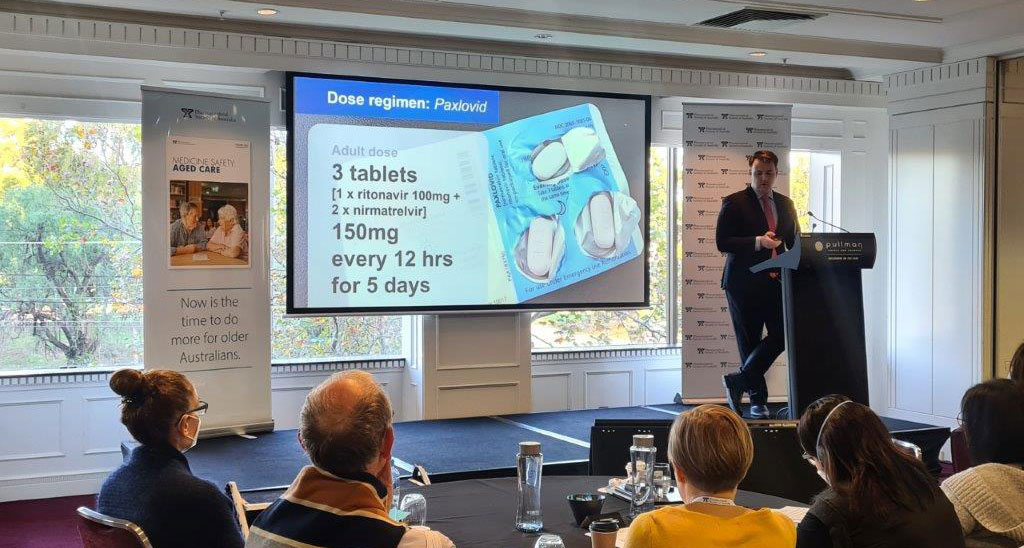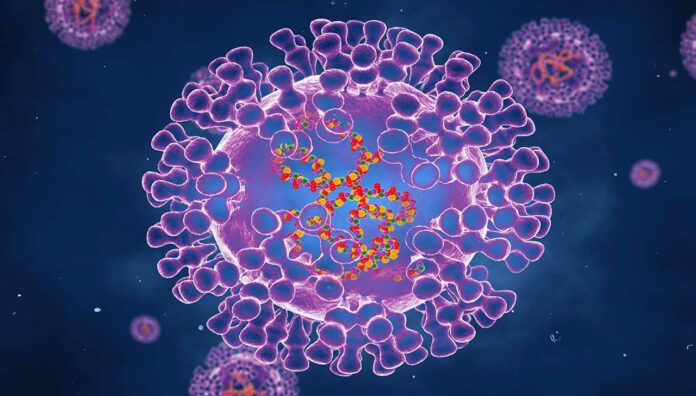Vaccination will be paramount to curb the spread of monkeypox and Japanese encephalitis in Australia, delegates at the weekend VIC/TAS Annual Therapeutic Update 2022 heard.
With the first cases of monkeypox detected in Australia last week, PSA Senior Pharmacist Peter Guthrey MPS updated the conference on the nation’s approach during a session on vaccination.
‘It’s very early days in the outbreak, and we don’t yet understand why it has spread beyond Africa in the way it has,’ he said.
‘The Victorian Department of Health leapt into action quickly, consulting with the Australian Health Protection Principal Committee to determine appropriate isolation periods and access to smallpox vaccines for close contacts.’
Smallpox vaccination can be given to close contacts as a preventive agent up to 4 days post-exposure to monkeypox, Mr Guthrey told attendees at the conference, held on 21–22 May.
Pharmacists are also helping to tackle the emerging Japanese encephalitis threat.
‘It’s really pleasing to see pharmacists able to contribute to the vaccination response for Japanese encephalitis in Victoria,’ Mr Guthrey said.
‘Pharmacists provide more flexibility to public health teams to get at-risk people, such as farmers and piggery workers, protected against Japanese encephalitis.’
Meanwhile, cases of influenza are surging across the country, particularly among teenagers.
‘Promoting vaccination in these age groups is so important,’ Mr Guthrey said.
‘The ability of pharmacists to administer the influenza vaccine to people aged 5 and over is an important step in helping increase access to flu vaccines this winter.’

COVID-19 antiviral oral treatment update
Both molnupiravir and nirmatrelvir/ritonavir have been shown to work well against COVID-19, Mr Guthrey said in a session on oral antivirals.
‘However, we don’t have head-to-head trials on efficacy, and should be very cautious when comparing efficacy data,’ he warned.
There is still much to learn about these medicines, Mr Guthrey said, with significant research expected to emerge in coming months.
But one thing is clear: for the most effective use, treatment should begin as soon as possible, meaning pharmacists must be adaptable to get the medicine into patients’ hands.
‘This may mean offering same-day home delivery options, which are not normally available, such as using couriers,’ Mr Guthrey said.
A change in parameters also means more pharmacists should now have access to the medicines.
‘We understand there is now flexibility in returns policies, which should allow most community pharmacies to stock these high-cost products on their shelves,’ he added.
Worrying patterns in child medicine use
Meanwhile in a session on medicine safety, Janet Browning from the Victorian Poisons Information Centre told attendees there are increasing concerns around the normalisation of medicine use among children and teenagers.
Two complementary medicines are behind most child-related calls to the Poisons Information Centre: Vita Gummies and melatonin.
When the sugar-coated vitamins are left on counter tops, children might take the opportunity to swipe as many as possible – like any other unguarded sweet.
‘We get kids taking 50 or 60 [Vita Gummies],’ Ms Browning said.
While there is only a minuscule amount of iron in the gummies, overuse can cause gastro-like symptoms such as diarrhoea, vomiting, constipation or headaches.
Melatonin, on the other hand, is related to a significant number of errors, including incorrect and double dosing, or accidentally administering the medicine to a sibling.
‘From our point of view, it seems like every child in Victoria is on melatonin right now,’ Ms Browning quipped.
What does medicine safety mean to you?
“Medicine safety means #pharmacists”
Bang! Amazing opening to the #medicinesafety panel#PSAATU pic.twitter.com/AIj9kzuXoB
— Peter Guthrey (@pguthreyRx) May 20, 2022
Most concerning, however, is that children are being conditioned to rely on medicines.
‘Why are we giving children a vitamin and a [tablet] each night to go to bed?’ she asked. ‘We’re training them that they need medication to sleep at night.’
Promoting melatonin use can also lead to medicine misadventure further down the line, as Ms Browning witnessed in a patient recently.
‘I had a young girl the other night [who] started on clonidine the week before,’ she said. ‘Her mum rang and said she had taken three of the 100 micrograms.’
The child had previously been advised by her GP that if melatonin wasn’t working, she should ‘have a couple more’.
‘She just presumed that would apply to her clonidine as well,’ Ms Browning said. ‘She ended up in the children’s hospital with postural hypotension for more than 24 hours.’
The PSA’s Victorian Branch President John Jackson FPS, who moderated the panel, said it’s crucial for pharmacists to impart their medicines wisdom to the public.
‘It’s a case of not assuming that everybody knows what we know, and taking every opportunity to pass on that need for caution,’ he said. ‘Such simple things that we would recognise and not blink an eye at can become devastating.’
Most patients want to take less medicines
In her years providing medication reviews, GP pharmacist Deborah Hawthorne MPS found many patients don’t know why they are taking their medicines – even if they have been taking them for years.
‘You [ask], “Why are you taking this TCA? Is it for pain?’’ and they say “No, no”,’ she told the medicine safety panel.
But most patients are keen to deprescribe. ‘It’s very rare to have a patient [who] doesn’t want to take less medicines,’ Ms Hawthorne said.
Most medication reviews she conducts also unearth myriad issues.
‘It would be very rare for me to do a medication review where I either don’t find something that’s not suitable and they shouldn’t be on it, or there’s no indication,’ she said.
Pharmacist wellbeing a priority
Alongside updates in patient care was a new focus – the impact of COVID-19 related stressors on healthcare workers over the past 2 years.
Factors such as risks when presenting to work, coupled with uncertain duration, social isolation, community mistrust and low supplies of medicines and rapid antigen tests have placed unprecedented demands on pharmacy workforces.
To heighten awareness of the importance of wellbeing among healthcare professionals, pharmacists were encouraged by the Pharmacists’ Support Service to share how they reduce stress.
Deb manages stress by running #PSAATU @PSA_National @psa_vic pic.twitter.com/iOHSffOS1f
— supportforpharmacists (@AusPharmSupport) May 21, 2022
Closing the conference, Mr Jackson emphasised the importance of self care.
‘If we don’t do that, we take our stresses home to our families, [and] we can’t be as good as we can for our patients,’ he said.
Don’t miss the next PSA event. Find out what’s on here.






 ‘We’re increasingly seeing incidents where alert fatigue has been identified as a contributing factor. It’s not that there wasn’t an alert in place, but that it was lost among the other alerts the clinician saw,’ Prof Baysari says.
‘We’re increasingly seeing incidents where alert fatigue has been identified as a contributing factor. It’s not that there wasn’t an alert in place, but that it was lost among the other alerts the clinician saw,’ Prof Baysari says.





